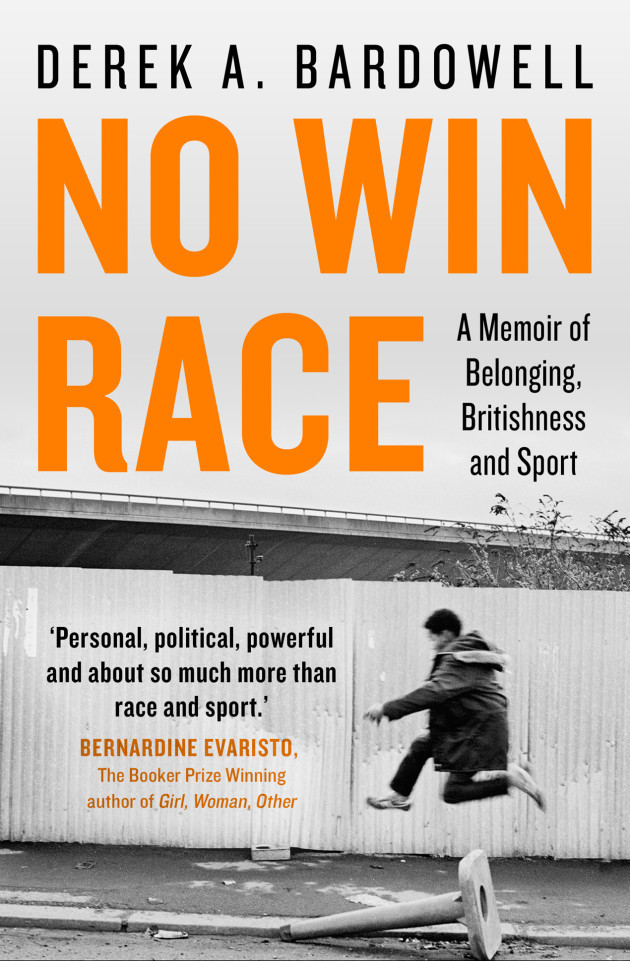THE FOLLOWING PASSAGE is an extract from ‘No Win Race’ by Derek A. Bardowell.
I was never a great Formula 1 fan. Admittedly when Hamilton came on the scene, I started following the sport in the back pages of the newspapers and online. I wanted him to win. Wanted him to do well. To me, he had been an underdog. But the best type of underdog, one you expected to win.
In every aspect of his life he had been different to, say, Lloyd Honeyghan. He had the same pit-bull attitude, an attitude I recognised when I was growing up in Newham. But I couldn’t quite relate to him in the same way. My Newham elders, the Windies, the hyphenated ’ballers, their attitude, their style, their urban-ness, had all been more familiar as part of the Codes I grew up with. Hamilton came across as more mainstream, less of a rebel. I didn’t think this was a bad thing. Perhaps this would be a sign of progression.
Yet, somehow, Hamilton became a symbol of a post-racial Britain without ever being fully embraced by the British public. Hamilton didn’t become the new Becks, even though he too had a celebrity girlfriend in Nicole Scherzinger, formerly of the Pussycat Dolls.
Hamilton remained successful. Not particularly controversial. Apolitical. Brash at times. A sore loser at times. He had been a master at his sport, able to generate speed like no other, always daring to take risks for victory; a man who respected the sport, respected its history and was obsessed with winning.
Hamilton wouldn’t win another world title until 2014, at which point he had moved from McLaren to Mercedes. But he remained the biggest name in the sport after the 2008 victory.
Despite this, it seemed that every single article I read about Hamilton would mention that he’s not very popular with the British public. His notoriety had been as a much a source of fascination as his driving skills.
It was not too long after winning his first world title that the theories started.
‘Lewis moved to Switzerland in 2007 and later to Monaco, both well-known tax havens.’
‘Lewis has a playboy lifestyle, a pop-singer girlfriend and spends most of his time hanging out at celebrity parties, all of which was terribly un-British.’
‘Lewis is too bling. The way he dresses, he’s more like an American rapper, like his pals Kanye West and Pharrell, than a British sports star.’
‘Lewis is a brat. Too entitled. Lacks humility, particularly when he loses. Sore loser. Arrogant. He never gets on with his teammates.’
‘Lewis is too good, too dominant. How is it that he can party so hard, hang with celebrities and yet win so many races? How can he really be focused on the task at hand?’
I struggled to understand why the British public could not embrace him. Why would he get a bad rap for his tax arrangements when other racing drivers, who also lived in Monaco, did not receive the same treatment?
David Beckham had a pop-star girlfriend in Posh Spice. Former Formula 1 world champion James Hunt had become an icon in part because of his playboy lifestyle.
It was not unusual for the likes of LeBron James and Cristiano Ronaldo to be splashed on celebrity pages, and Hamilton being a bit of a sore loser was hardly an unprecedented response in motor racing. As for him partying too hard, as one publication put it, he just had a good work–life balance.
Hamilton himself offered little in the way of explaining why he had not been embraced by the public. ‘The way I live my life,’ he once said. ‘And maybe where I live. Who knows?’
Racing legend Stirling Moss once said, ‘He was one of the racing crowd before, and now he’s whatever you call those superstars. And that’s not really the way we English go. We’re more reserved.’
I always felt that the British public acknowledged Hamilton’s brilliance. I also felt they bought into the post-racial narrative. If he can, any black can. He had become a symbol that we are now living in a society of equal opportunities.
But I also felt that his lack of popularity had been racialised, without ever being explicit.
Lewis was not going to be what anyone wanted him to be, and I think that caused resentment. He was not going to play the Frank Bruno role for the camera or express his Britishness in a way that an Ian Wright or Paul Ince had displayed.
I think there was a feeling that Hamilton’s colour had meant he’d received preferential treatment, from his teams, from team orders, from sponsors.
Almost a suggestion that he had not been as good as billed. That his colour, the novelty, was a major part of his success, the reason why he had been pushed to the forefront. Positive discrimination.
The British public had been checking Hamilton’s privilege while ignoring the fact that he had been the superior driver to most of his teammates and acknowledged by most as the best driver on the circuit, even in seasons when he did not have a strong enough car to win the championship.
Hamilton’s growing links to black culture was also hard to ignore, particularly his relationship with American rappers. He was more bling than bulldog. I think this caused resentment. He had become a 21st-century uppity urban negro who did not know his place.
Hamilton’s Englishness tinged with African-American culture and swag had not been quintessentially British. There was a highly racialised narrative at play without anyone really saying it. Not the writers. Not Lewis. Not anyone in Formula 1. It went unsaid and the implicit digs from the media continued.
What had become clear was that the post-racial narrative did not reflect what had been happening in British society.
Extract from No Win Race: A Memoir of Belonging, Britishness and Sport by Derek Bardowell (Mudlark, £9.99)


